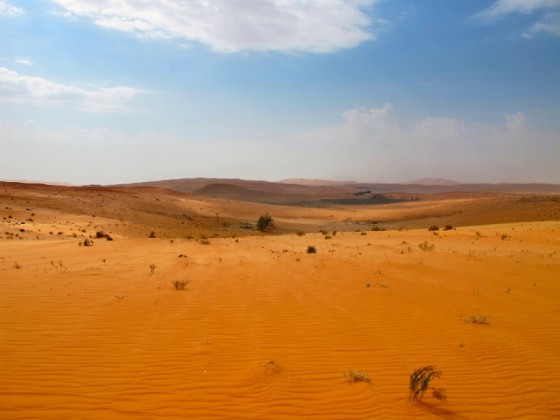 Saudi Arabia and climate change do not mix well as this photo indicates
Saudi Arabia and climate change do not mix well as this photo indicates
As Earth Day 2013 approaches on April 22, issues of water options in arid countries like Saudi Arabia will be high on the agenda. Countries in the Middle East that face increasing water shortages, especially those situated on the Arabian Peninsula, have to rely more on energy intensive desalination and “importing” water from other locations, including the over-stressed Nile River. The current water crises in Saudi Arabia, for example, has pushed them to build the world’s largest desalination plant to provide enough drinking water for its population. Desalination has not been the answer for the country’s agriculture efforts, however.
Scientific researchers investigating the effects of climate change in Saudi Arabia predict that by the year 2050 increasing temperatures and lack of adequate annual rainfall will have a serious affect on the country’s agricultural infrastructure.
In an article published on Scientific Development, scientists in Saudi Arabia warn that “average temperatures in Saudi Arabia could increase by as much as four degrees Celsius, increasing agricultural water demands by up to 15 per cent to maintain current productivity levels.”
Scientists also fear that higher temperatures will result in increased amounts of “organic matter” such as ammonia, nitrogen and phosphorus in existing surface water. Rainfall that does occur, often in late summer or early fall, is also lost by environmental surface runoff which damages the soil even further. Scientists fear that changes in weather patterns will also result in flooding from too much rainfall occurring in some areas of the peninsula.
This occurred in 2009 when abnormally heavy rainfall fell in Jeddah causing flooding that killed more than 150 people.
Unusually intense amounts of rainfall caused sewage lagoon dams to break, resulting in intense flash flooding.
To prevent such incidents from reoccurring,climate change adaptation expert at the African Development Bank, Balgis Osman-Elasha recommends that increased infrastructure projects be made to prevent ground water runoff and save water resources through better water conservation methods.
In any event, the reality of climate change will have to be faced in these arid countries where more reliance on projects like desalination will become the norm.
More about Earth Day and Saudi water issues:
Recycling for Earth Day
Saudi Takes a Chunk of Nile Water to Feed Its Cows
Saudi Options Narrow With Peak Water
Saudi Arabia to Replace Oil with Sun Power for Desalination Plants
Image Arabian Desert Sand by Shutterstock


